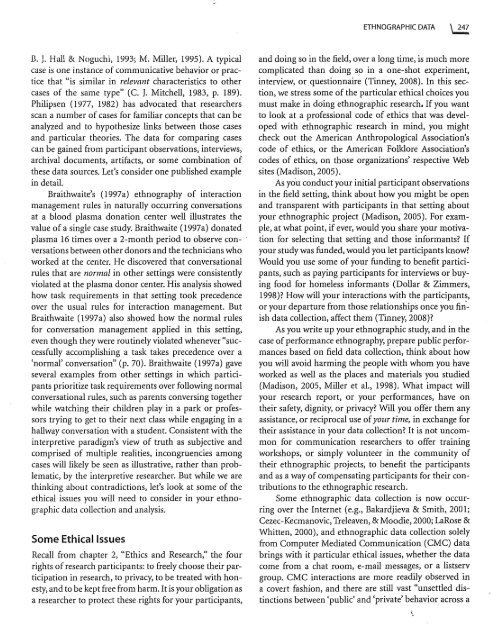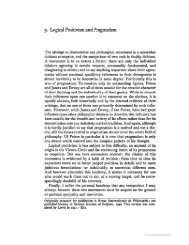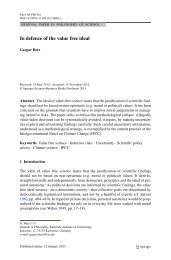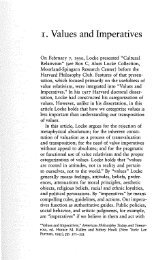Ethnographic Research - Matthew J. Brown
Ethnographic Research - Matthew J. Brown
Ethnographic Research - Matthew J. Brown
- No tags were found...
You also want an ePaper? Increase the reach of your titles
YUMPU automatically turns print PDFs into web optimized ePapers that Google loves.
ETHNOGRAPHIC DATA \ 247fl. J. Hall & Noguchi, 1993; M. Miller, 1995). A typicalcase is one instance of communicative behavior or practicethat "is similar in relevant characteristics to othercases of the same type" (c. J. Mitchell, 1983, p. 189).Philipsen (1977, 1982) has advocated that researchersscan a number of cases for familiar concepts that can beanalyzed and to hypothesize links between those casesand particular theories. The data for comparing casescan be gained from participant observations, interviews,archival documents, artifacts, or some combination ofthese data sources. Let's consider one published examplein detail.Braithwaite's (l997a) ethnography of interactionmanagement rules in naturally occurring conversationsat a blood plasma donation center well illustrates thevalue of a single case study. Braithwaite (l997a) donatedplasma 16 times over a 2-month period to observe con- .versations between other donors and the technicians whoworked at the center. He discovered that conversationalrules that are normal in other settings were consistentlyviolated at the plasma donor center. His analysis showedhow task requirements in that setting took precedenceover the usual rules for interaction management. ButBraithwaite (l997a) also showed how the normal rulesfor conversation management applied in this setting,even though they were routinely violated whenever "successfullyaccomplishing a task takes precedence over a'normal' conversation" (p. 70). Braithwaite (l997a) gaveseveral examples from other settings in which participantsprioritize task requirements over following normalconversational rules, such as parents conversing togetherwhile watching their children play in a park or professorstrying to get to their next class while engaging in ahallway conversation with a student. Consistent with theinterpretive paradigm's view of truth as subjective andcomprised of multiple realities, in congruencies amongcases will likely be seen as illustrative, rather than problematic,by the interpretive researcher. But while we arethinking about contradictions, let's look at some of theethical issues you will need to consider in your ethnographicdata collection and analysis.Some Ethical IssuesRecall from chapter 2, "Ethics and <strong>Research</strong>," the fourrights of research participants: to freely choose their participationin research, to privacy, to be treated with honesty,and to be kept free from harm. It is your obligation asa researcher to protect these rights for your participants,and doing so in the field, over a long time, is much morecomplicated than doing so in a one-shot experiment,interview, or .questionnaire (Tinney, 2008). In this section,we stress some of the particular ethical choices youmust make in doing ethnographic research. If you wantto look at a professional code of ethics that was developedwith ethnographic research in mind, you mightcheck out the American Anthropological Association'scode of ethics, or the American Folklore Association'scodes of ethics, on those organizations' respective Websites (Madison, 2005).As you conduct your initial participant observationsin the field setting, think about how you might be openand transparent with participants in that setting aboutyour ethnographic project (Madison, 2005). For example,at what point, if ever, would you share your motivationfor selecting that setting and those informants? Ifyour study was funded, would you let participants know?Would you use some of your funding to benefit participants,such as paying participants for interviews or buyingfood for homeless informants (Dollar & Zimmers,1998)? How will your interactions with the participants,or your departure from those relationships once you fin·ish data collection, affect them (Tinney, 2008)?As you write up your ethnographic study, and in thecase of performance ethnography, prepare public performancesbased on field data collection, think about howyou will avoid harming the people with whom you haveworked as well as the places and materials you studied(Madison, 2005, Miller et al., 1998). What impact willyour research report, or your performances, have ontheir safety, dignity, or privacy? Will you offer them anyassistance, or reciprocal use of your time, in exchange fortheir assistance in your data collection? It is not uncommonfor communication researchers to offer trainingworkshops, or simply volunteer in the community oftheir ethnographic projects, to benefit the participantsand as a way of compensating participants for their contributionsto the ethnographic research.Some ethnographic data collection is now occurringover the Internet (e.g., Bakardjieva & Smith, 2001;Cezec-Kecmanovic, Treleaven, & Moodie, 2000; LaRose &Whitten, 2000), and ethnographic data collection solelyfrom Computer Mediated Communication (CMC) databrings with it particular ethical issues, whether the datacome from a chat room, e-mail messages, or a listservgroup. CMC interactions are more readily observed ina covert fashion, and there are still vast "unsettled distinctionsbetween 'public' and 'private' behavior across a






